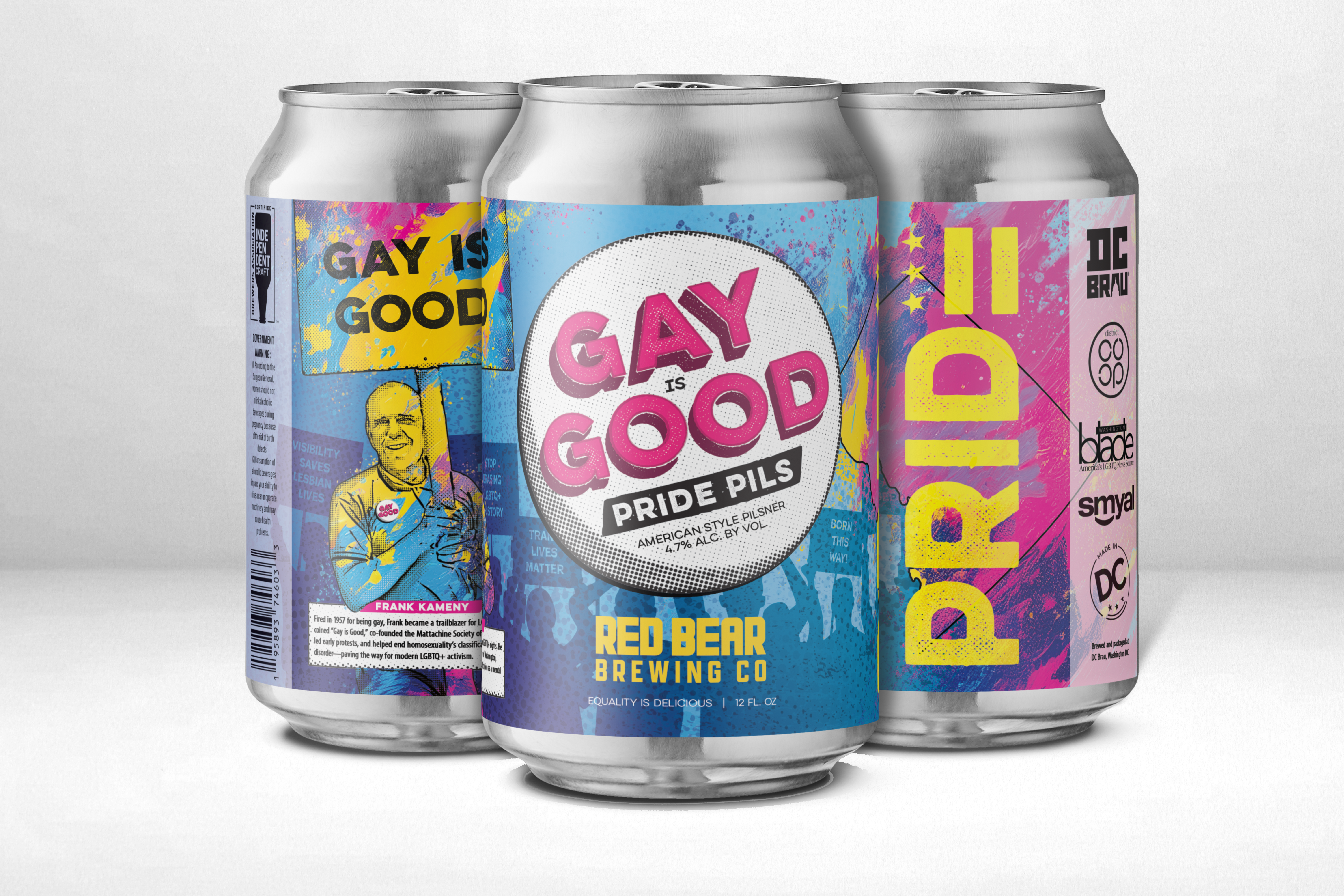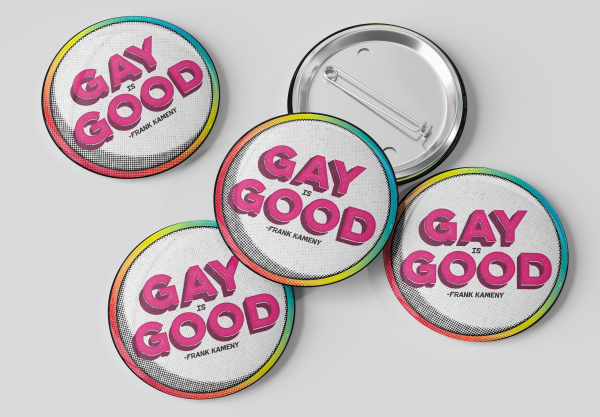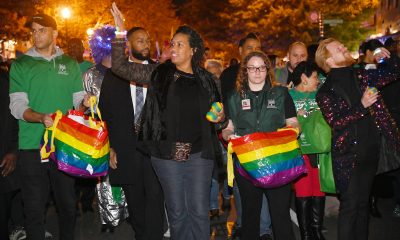Arts & Entertainment
Say Anything lead singer Max Bemis opens about his sexuality
The performer also announces the band will be on hiatus

Say Anything lead singer Max Bemis (Photo via Wikimedia Commons)
Say Anything lead singer Max Bemis has opened up about his sexuality in a candid letter to fans.
In the nine-page letter titled “A Goodbye Summation,” Bemis, who also has been open about his bipolar disorder, says that he identifies as “bi-ish” or “queer.”
“I have always been bi-ish or queer or a straight guy who can also like boys,” Bemis, 34, writes. “I always talked or joked about it with my friends and found it to be blatantly clear I was. I was bullied for it and called a ‘fag’ (without irony). This is, sadly, common. I’m not special. I even went so far as to tell people I was also attracted to guys repeatedly. They chalked it up to my bipolar shit, which was hurtful.”
Bemis goes on to explain how people trivialized his sexuality because he fell in love with and married his wife Sherri Dupree-Bemis.
“They also minimized it because I found true love early in life, and saw that as a negation of my sexuality, or at least a minimization of my right to even identify as bisexual or queer. Because I don’t want to hook up with guys. But I also didn’t hook up with a lot of girls. I wanted to fall in love with a woman, so I did,” Bemis writes.
He concluded about his sexuality,” So yeah, I’m a queer, Jewish, Christian skeptic pseudo-anarchist with a belief in metaphysics and the application of ‘magical’ stuff. Woof.”
Bemis also announced the ending of an era for his band Say Anything.
“Our plans as a collective are to, kind of sort of, end Say Anything,” Bemis writes.. ” Or ‘the first era of Say Anything’. Whatever you want to call it, it’s that thing.” However, he says the band will return to “to play festivals and scoff at our career.”
Say Anything will release its new album “OLIVER APPROPRIATE” but there will be no tour in promotion of the album. The character of Oliver on the album is meant to be a reflection of Bemis’ own struggle with his sexual identity.
“I chose to write a full length about a self-loathing, slightly homophobic misogynist; essentially my opposite as a semi-actually-kinda-gay neurotic moralist who has been married to the female love of my life for ten years,” Bemis describes the character. “A man who kisses boys at beer-soaked coke parties as some kind of ironic joke instead of because he actually allows himself to find them attractive in an emotional sense.”
Say Anything is Saying Goodbye. Thank you for everything. But there’s more to come. Let’s celebrate and feel this together. Follow the link for all the details. First news item on our site with a novella of a PDF to peruse that explains everything. https://t.co/tgwdvaTGGe
— Max Bemis (@maxbemis) August 16, 2018
Arts & Entertainment
‘Gay is Good’ Pride Pils Can Celebrates Frank Kameny’s 100th Birthday for WorldPride in D.C.

In celebration of WorldPride 2025 coming to the nation’s capital, Red Bear Brewing Co. is proud to unveil the 8th edition of its beloved Pride Pils can — themed “Gay is Good” — honoring LGBTQ+ civil rights icon Frank Kameny on what would be his 100th birthday.
The 2025 design bursts with pop-art color and protest-inspired energy, featuring a bold illustration of Kameny holding a sign declaring “GAY IS GOOD,” a phrase he coined in the 1960s to inspire queer pride and challenge societal prejudice. The background is filled with rally signs and silhouettes of activists, representing decades of LGBTQ+ resistance and progress.
“Frank Kameny was a trailblazer who helped ignite the modern LGBTQ+ rights movement,” said Red Bear co-founder Bryan Van Den Oever. “We’re honored to celebrate his life and legacy during this historic World Pride year in D.C.”
This year’s Pride Pils release marks a continued partnership between Red Bear Brewing Co., DC Brau, and LGBTQ+ community partners including The Washington Blade, SMYAL, and District CoOp. The Pride Pils campaign originally launched by DC Brau and the Washington Blade has raised more than $55,000 for local LGBTQ+ causes. Now, Red Bear proudly carries the torch, donating 100% of profits from Pride Pils sales to SMYAL and LGBTQ+ nonprofit efforts.
Frank Kameny, a pioneer in LGBTQ+ activism, was fired from his federal job in 1957 for being gay. Refusing to stay silent, he co-founded the Mattachine Society of Washington, D.C., led some of the first gay rights protests in front of the White House, and fought to remove homosexuality from the American Psychiatric Association’s list of mental disorders. His unrelenting advocacy laid the groundwork for generations of progress.
With D.C. preparing to host hundreds of thousands of visitors for WorldPride 2025, this year’s Pride Pils can stands as a toast to the power of protest, visibility, and queer joy.
The limited-edition Pride Pils will be available starting May 2025 at bars, restaurants, and retailers across the DMV.
Join the celebration at the Pride Pils Launch Party, happening on Frank Kameny’s 100th birthday — May 21st, 6–8 PM at Crush (2007 14th St NW), D.C.’s newest LGBTQ+ bar.
Pride Pils merchandise is available now from District CoOp HERE.


Friday, April 11
“Center Aging Friday Tea Time” will be at 2 p.m. on Zoom. This is a social hour for older LGBTQ adults. Guests are encouraged to bring a beverage of choice. For more details, email [email protected].
Women in their Twenties and Thirties will be at 8 p.m. on Zoom. This is a social discussion group for queer women in the Washington, D.C. area and a great way to make new friends and meet other queer women in a fun and friendly setting. For more details, join the group’s closed Facebook group.
Go Gay DC will host “LGBTQ+ Community Happy Hour” at 7 p.m. at Crush. This event is ideal for making new friends, professional networking, idea-sharing, and community building. This event is free and more details are available on Eventbrite.
Saturday, April 12
Go Gay DC will host “LGBTQ+ Community Brunch” at 11 a.m. at Freddie’s Beach Bar & Restaurant. This fun weekly event brings the DMV area LGBTQ community, including allies, together for delicious food and conversation. Attendance is free and more details are available on Eventbrite.
“Spark Sapphic Social” will be at 8 p.m. at Spark Social House. This weekly sapphic social is an opportunity to mix and mingle with other sapphics in D.C.’s newest LGBTQ bar. This event is free and more details are available on Eventbrite.
Sunday, April 13
Firearm Safety & Protection Training for Queer Black Folks will be at 9 a.m. in Washington, D.C. Whether you’re seeking to obtain your Handgun Qualification License (HQL) or a Concealed Carry Permit, this training will provide you with the education, hands-on experience, and confidence needed to protect yourself and your community responsibly. More details are available on Eventbrite.
Monday, April 14
“Center Aging Monday Coffee & Conversation” will be at 10 a.m. on Zoom. This is a social hour for older LGBTQ+ adults. Guests are encouraged to bring a beverage of choice. For more details, email [email protected].
Genderqueer DC will be at 7 p.m. on Zoom. This is a support group for people who identify outside of the gender binary, whether you’re bigender, agender, genderfluid, or just know that you’re not 100% cis. For more information, visit genderqueerdc.org or Facebook.
Tuesday, April 15
Center Bi+ Roundtable will be at 7 p.m. on Zoom. This event is an opportunity for people to gather in order to discuss issues related to bisexuality or as bi individuals in a private setting. Visit Facebook or Meetup for more information.
DC Pride Poets will host “Pride Poetry Workshop: Poetry in Translation, led by Saundra Rose Maley” at 6:30 p.m. at Arts Club of Washington. Participants will look at ghazals by Urdu master poet Ghalib, translated by a range of American poets into English. There will be discussions about how and why translations vary, and how reading poems in translation can affect a writer’s own poetry. For more details, visit Eventbrite.
Wednesday, April 16
Job Club will be at 6 p.m. on Zoom. This is a weekly job support program to help job entrants and seekers, including the long-term unemployed, improve self-confidence, motivation, resilience and productivity for effective job searches and networking — allowing participants to move away from being merely “applicants” toward being “candidates.” For more information, email [email protected] or visit thedccenter.org/careers.
Thursday, April 17
Poly Group Discussion will be at 7 p.m. on Zoom. This is an inclusive, welcoming, virtual safer space to talk about all things polyamorous. The rapturous, the confused, the pure YIKES, we want to hear them all. For more details, email [email protected].
Lit Lovers: Book Club for Seniors will be at 2:00p.m. at the DC Center for the LGBT Community. The book selection for April is “Dancer from the Dance” by Andrew Holleran. There will be light refreshments. For more details, visit the DC Center’s website.
The DC Center’s Fresh Produce Program will be held all day at the DC Center for the LGBT Community. To be more fair with who is receiving boxes, the program is moving to a lottery system. People will be informed on Wednesday at 5:00 pm if they are picked to receive a produce box. No proof of residency or income is required. For more information, email [email protected] or call 202-682-2245.
Virtual Yoga with Charles M. will be at 7 p.m. on Zoom. This is a free weekly class focusing on yoga, breathwork, and meditation. For more details, visit the DC Center for the LGBT Community’s website.
Movies
An ‘Indian Boy’ challenges family tradition in sweet romcom
Refreshing look at what is possible when a family is willing to make changes

For queer audiences hungry for representation, nothing says “I feel seen” quite as much as a good queer romcom.
Perhaps it’s because love stories are universal, differing from culture to culture in the surface dealings only, and therefore have the potential for helping straight audiences understand a different kind of love a little better; or perhaps, in seeing our kind of love displayed so publicly, we feel a sense of validation. Whatever the reason, it rings our bell.
Maybe that’s why the quest for the first “great gay romcom” has continued to be a driving factor in the ongoing history of queer cinema, setting up an expectation in the mainstream that has, perhaps inevitably, fallen short of creating it. Fortunately, there are some efforts that have risen above the pressure to simply be what they are, instead of being the answer to everybody’s prayers for acceptance, and in so doing have managed to come close.
“A Nice Indian Boy” is just that kind of movie. Adapted from a play by Madhuri Sheka (by Eric Randall, whose screenplay made Hollywood’s buzzy “Black List” of un-produced scripts in 2021) and directed by Canadian-born Indian filmmaker Roshah Sethi, it might come closer to presenting an entirely successful gay romcom than most of the other overthought efforts that have come before.
It centers on Naveen (Karan Soni), a 30-something gay doctor, whose South Asian Indian family has long since accepted and supported his orientation but still struggles to reconcile it with their traditional beliefs. Enter Jay (Jonathan Groff), a white freelance photographer who grew up as an adoptee to Indian parents, and of course it’s love at first sight. A whirlwind courtship leads to a proposal, but there are a lot of considerations that must be met before the smitten couple can achieve the “big Indian wedding” of their dreams. The one that looms largest is gaining the approval of Naveen’s progressive-but-devout Hindu parents (Harish Patel and Zarna Garg) – not to mention his discontented sister (Sunita Mani) – whose confusion over his new fiancé’s ethnicity is just one of many obstacles they face in making their dream nuptials a reality. Intensifying that challenge – frequently to comedic effect – is Naveen’s struggle with his own insecurities, which threaten to derail not only the wedding plans but his relationship with the emotionally open and unreservedly passionate Jay, too.
It’s a sweet and clearly heartfelt affair, with a few laugh-out-loud moments to be found, as well as the wry introspection of its neurotic lead character, whose self-questioning turmoils feel like a connecting thread to the work of Woody Allen – indeed, “Annie Hall” is even name-dropped in the film, suggesting a spirit of homage that can be traced in a reflection of that classic Oscar-winner’s title character through Jay’s quirkily unconventional personality.
At the same time, the movie marries its diverse cultural influences by drawing just as heavily from a love of “Bollywood” cinema, and one of its movies in particular, which both of its protagonists adore. That allows it to maintain an aura of lush, larger-than-life romanticism that complements the amusingly endearing self-deprecation of its main protagonist; it also reflects in the movie’s colorful, lively visual aesthetic and its choice to share focus on an entire family of characters for a more sweeping perspective.
As for its handling of the subject of race, despite its clear (and queer) twist on the “Guess Who’s Coming to Dinner?” trope of a family’s surprise over a bi-ethnic romance in its midst, “Indian Boy” doesn’t spend much time worrying about a love connection shared across racial divides; and while it gets considerable comic mileage out of Naveen’s parents’ well-intentioned but clueless efforts to show their acceptance of their gay son, the queerness of his relationship is not really an issue in itself. Rather, the conflict comes – for all of the movie’s primary characters, not just for the couple in the middle – from the difficulty of finding harmony between old customs and a new world that no longer fits within their boundaries.
Admittedly, Sethi’s movie sometimes feels a little too sentimental to be believed; it paints an aspirational picture – a true-love romance between a successful doctor and a rising artist – and tugs even harder on our heartstrings with its depictions of clumsy-but-sincere acceptance from the family around them; and while we don’t want to spoil any surprises, when it comes time for the big finale, it pulls out all the feel-good stops. Cynics in the audience might fail to be as enchanted as it wants them to be.
And yet, it all works wonderfully, largely because of its cast. Soni and Groff have an instantly tangible chemistry, and their differing personalities complement each other perfectly. Individually, they take us with them on their personal journeys with just as much clarity and conviction, and the movie would fall flat without the strength of their performances at its core.
Equally superb, however, are Patel and Garg, whose discomfort over the preparations for their son’s wedding never feel like they come from anywhere but love and a desire to share in his happiness; and Suri, whose considerable comedic talents contrast to great effect with the brewing discord within, lends a much-needed weight to the mix while still managing to glow alongside all her costars.
Combined with the sharp, funny, and insightful script and the generosity of Sethi’s directorial approach, which frames each character with respect and import to the story, it all makes “A Nice Indian Boy” a nice crowd-pleasing movie to see. It may or may not be “the great gay romcom,” and it might all seem a bit too glossy and perfect for some viewers’ taste – but it offers a refreshing look at what is possible when a family is willing to make changes in their way of life simply for the sake of love. What message could be more positive than that?
“A Nice Indian Boy” is now playing in theaters.
-

 District of Columbia1 day ago
District of Columbia1 day agoWorldPride organizers may warn trans people from abroad not to attend event
-

 District of Columbia3 days ago
District of Columbia3 days agoLocal officials weighing impact of Trump’s D.C. executive order
-

 South Africa5 days ago
South Africa5 days agoUS-funded South African LGBTQ groups curtail operations
-

 Maryland3 days ago
Maryland3 days agoTrans Maryland founder: Trans people ‘are afraid’






